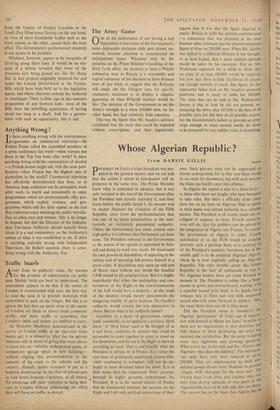The Army Game
ONE of the misfortunes of not having a real Opposition is that some of the Government's more deplorable decisions slide past almost un- noticed, because attention is concentrated on unimportant issues. Whatever may be the opinions on the Prime Minister's handling of the Holy Loch affair, the decision to have a Polaris submarine base in Britain is a reasonable and logical extension of the decision to have H-bases here of any kind; to suggest that the Russians will single out the Glasgow area for specific retaliatory treatment is to display a singular ignorance of what H-bomb warfare would be like. The decision of the Government to set the Army's strength at a mere 165,000 men, on the other hand, has had relatively little attention.
This was the figure that Mr. Sandys's advisers calculated was the most that could be expected without conscription; and they ingeniously argued that it was also the figure required to enable Britain to fulfil her defence commitments —a contention that was disputed at the time because other estimates put the desired minimum figure at close on 200,000 men. When Mr. Sandys was shifted to a different Ministry it was thought, or at least hoped, that a more realistic attitude would be taken by his successor. Not so. Mr. Watkinson appeared for a while to think that an army of at least 180,000 would be required, but now that there is little likelihood of obtain- ing enough recruits to reach that figure, he has apparently fallen back on Mr. Sandys's prepared positions, and is ready to settle for 165,000. The most that can be said in Mr. Watkinson's favour is that at least he did not pretend, an- nouncing the news, that 165,000 is the best of all possible sizes for this best of all possible armies; but the Government's failure to provide an army large enough to meet current needs, let alone to be prepared for any sudden crisis, is disturbing.














































 Previous page
Previous page